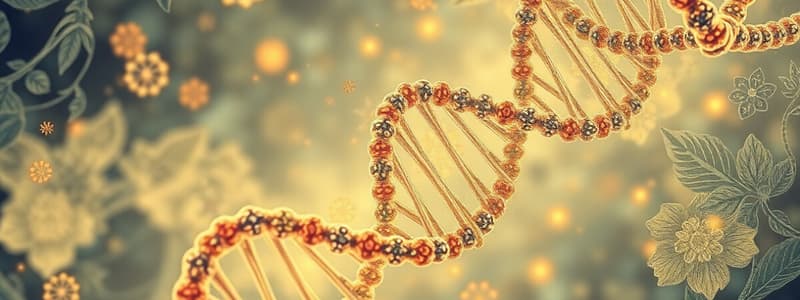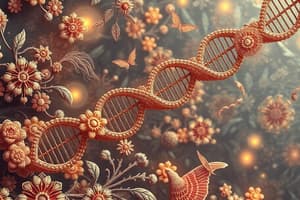Podcast
Questions and Answers
What is the primary function of restriction endonucleases in biotechnology?
What is the primary function of restriction endonucleases in biotechnology?
- To amplify DNA sequences
- To connect fragments of DNA
- To cut DNA at specific sequences (correct)
- To separate DNA molecules by size
Which of the following processes is specifically used for amplifying DNA sequences?
Which of the following processes is specifically used for amplifying DNA sequences?
- Polymerase chain reaction (PCR) (correct)
- Gel electrophoresis
- DNA sequencing
- Restriction fragment length polymorphism (RFLP)
How does gel electrophoresis assist in DNA analysis?
How does gel electrophoresis assist in DNA analysis?
- By separating DNA molecules by size (correct)
- By connecting fragments of DNA
- By sequencing the DNA
- By cutting DNA at specific sequences
What role do methylases play in DNA manipulation?
What role do methylases play in DNA manipulation?
Which biotechnology application is involved in identifying unknown species?
Which biotechnology application is involved in identifying unknown species?
Which of the following statements about plasmids is correct?
Which of the following statements about plasmids is correct?
Gel electrophoresis can only be used for paternity testing.
Gel electrophoresis can only be used for paternity testing.
What is the purpose of the polymerase chain reaction (PCR)?
What is the purpose of the polymerase chain reaction (PCR)?
The enzyme that connects DNA fragments together is called __________.
The enzyme that connects DNA fragments together is called __________.
Match the following biotechnology applications with their descriptions:
Match the following biotechnology applications with their descriptions:
Which of the following is NOT an application of the Barcode of Life project?
Which of the following is NOT an application of the Barcode of Life project?
Restriction endonucleases are involved in the insertion of new DNA sequences.
Restriction endonucleases are involved in the insertion of new DNA sequences.
What is the main focus of red biotechnology?
What is the main focus of red biotechnology?
Plasmids are primarily used in __________ studies to analyze genetic information.
Plasmids are primarily used in __________ studies to analyze genetic information.
What process is used to separate DNA molecules by size?
What process is used to separate DNA molecules by size?
Flashcards
Biotechnology
Biotechnology
Using living things or their parts to make products or processes, like in agriculture, medicine, or environment.
Restriction endonucleases
Restriction endonucleases
Enzymes that cut DNA at specific spots.
Gel electrophoresis
Gel electrophoresis
Separates DNA fragments by size using an electric field.
Plasmid
Plasmid
Signup and view all the flashcards
Polymerase Chain Reaction (PCR)
Polymerase Chain Reaction (PCR)
Signup and view all the flashcards
Methylases
Methylases
Signup and view all the flashcards
DNA ligases
DNA ligases
Signup and view all the flashcards
What is gel electrophoresis used for?
What is gel electrophoresis used for?
Signup and view all the flashcards
What are plasmids?
What are plasmids?
Signup and view all the flashcards
What is Polymerase Chain Reaction (PCR)?
What is Polymerase Chain Reaction (PCR)?
Signup and view all the flashcards
What is 'Barcode of Life' project?
What is 'Barcode of Life' project?
Signup and view all the flashcards
What are some applications of 'Barcode of Life'?
What are some applications of 'Barcode of Life'?
Signup and view all the flashcards
Red Biotechnology
Red Biotechnology
Signup and view all the flashcards
What is Restriction Fragment Length Polymorphism (RFLP)?
What is Restriction Fragment Length Polymorphism (RFLP)?
Signup and view all the flashcards
Green Biotechnology
Green Biotechnology
Signup and view all the flashcards
Study Notes
Biotechnology Overview
- Biotechnology is using living organisms or substances from living organisms to make products or processes. It can be used in agriculture, medicine, and the environment.
Tools in Biotechnology
- Restriction endonucleases: Enzymes that cut DNA at specific nucleotide sequences. A new sequence insertion doesn't usually happen with this technique (unlike CRISPR).
- Methylases: Enzymes that protect DNA from cleavage or damage.
- DNA ligases: Enzymes that join DNA fragments together.
- Gel electrophoresis: Separates DNA molecules by size; used for DNA analysis, DNA fingerprinting, and paternity testing.
Specific Techniques
- Plasmids: Circular DNA in bacteria; scientists use them to study antibiotic resistance and gene expression.
- Polymerase Chain Reaction (PCR): Amplifies DNA sequences to create multiple copies, allowing for many tests and research scenarios.
- DNA sequencing: Used in projects like the Human Genome Project and the Barcode of Life; provides the order of nucleotides in a DNA segment.
Types of Biotechnology
- Red Biotechnology: Medical applications, including producing antibiotics, vaccines, and pharmaceuticals; also genetic screening, gene therapy, and cloning.
- Green Biotechnology: Agricultural processes; includes transgenic plants (modifying plants with genes from other organisms) that have increased yields, nutritional content, and pest/environmental resistance.
- White Biotechnology: Industrial processes; includes bioremediation (cleaning contaminated soil or water with microorganisms) and using enzymes as catalysts to make valuable chemicals or eliminate dangerous ones.
- Blue Biotechnology: Marine and aquatic processes; aims to increase seafood supply and safety and control harmful waterborne organisms, as well as developing new drugs.
Applications
- Restriction Fragment Length Polymorphism (RFLP): Used to compare DNA fragment differences, used to identify disease markers in individuals (diseases like cystic fibrosis, CF). RFLP requires more blood compared to PCR.
- Examples of Biotechnology: Includes artificial selection, artificial insemination, brewing and fermentation, medicine and pharmaceuticals, gene splicing, stem cells and tissue regeneration, cloning, DNA testing and genomic sequencing, protein purification, and microbial synthetic biology.
Studying That Suits You
Use AI to generate personalized quizzes and flashcards to suit your learning preferences.




